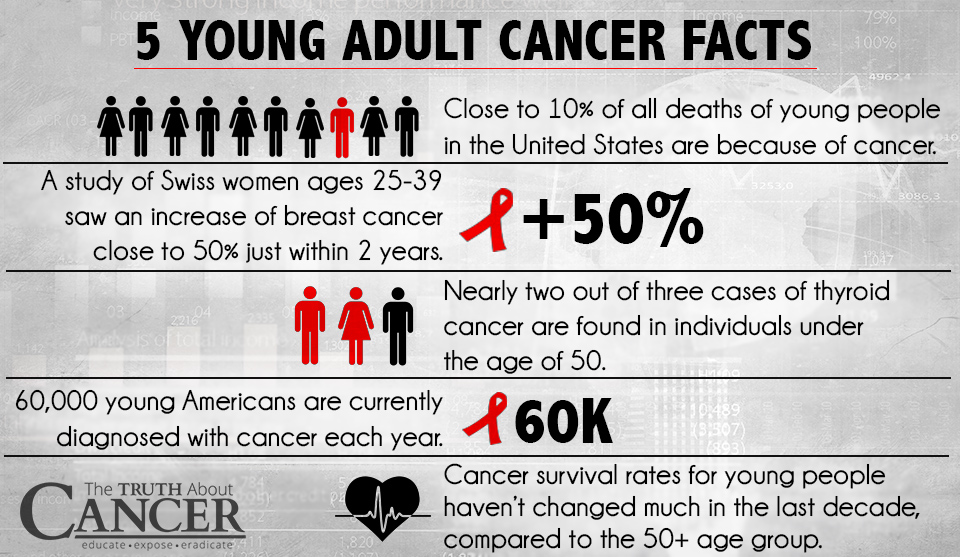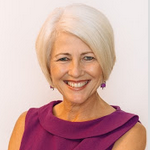10 Tips for Preventing Cancer in Young Adults
Young men and women who
are just starting out in life shouldn’t have to worry about something
like cancer. The fact that there even needs to be a national awareness
week for young adult cancer saddens me. But the facts don’t lie: cancer
is on the rise when it comes to people under 50.
Even though currently only about 4% of all cancer diagnoses in the United States are of young people, that number is set to rise drastically in the coming years if nothing changes.
How can we stop the travesty of cancer from happening to the next generation of our youth?
People it their 20s and 30s, however, have some added hurdles to jump over. Heavy social stigma around the disease can come not just from peers; many conventional doctors still don’t take the possibility of cancer seriously for their younger patients. Couple this bias with the fact that individuals ages 20-40 are the least insured segment of the population, and many easily-reversible pre-cancerous conditions may go unnoticed until it’s too late.
If you are young and you are concerned about cancer, or if you are the concerned parent of a young adult, there are things you can do RIGHT NOW to keep healthy and cancer-free. Besides safe, very early detection, consider the following:

Even though currently only about 4% of all cancer diagnoses in the United States are of young people, that number is set to rise drastically in the coming years if nothing changes.
How can we stop the travesty of cancer from happening to the next generation of our youth?
Some Scary Statistics About Cancer in Young Adults
Here are some cancer statistics that may surprise you:- More than 60,000 American 20 and 30-something’s are currently diagnosed with cancer each year
- Cancer accounts for close to 10% of all deaths of young people in United States. It is the leading cause of death from disease for young girls
- Survival rates for young people with cancer in general have not changed much in the last decade, compared to slightly higher rates of survival for people 50 and older
- The number of people in this age group who will be diagnosed with colon cancer is expected to increase by 90% by 2030.
- The number of young people who will be diagnosed with rectal cancer could increase by 124%, according to a recent University of Texas study
- The number of young women diagnosed with breast cancer in the United States has risen steadily over the last four decades. Aggressive forms of breast cancer are on the rise for young women in other countries as well. A 2007 study of Swiss women ages 25-39 saw an increase of close to 50% just in the years 2002-2004 alone
- Nearly two out of three cases of thyroid cancer are found in individuals under the age of 50, according to the American Cancer Society
As a Young Adult: 10 Things You Can Do To Prevent Cancer NOW
It is no surprise that rates for diseases such as breast, thyroid, and colon cancer are on the rise in young people. Like the population at large, lifestyle, eating habits, and environmental toxins are the common sense cancer culprits when it comes to young people.People it their 20s and 30s, however, have some added hurdles to jump over. Heavy social stigma around the disease can come not just from peers; many conventional doctors still don’t take the possibility of cancer seriously for their younger patients. Couple this bias with the fact that individuals ages 20-40 are the least insured segment of the population, and many easily-reversible pre-cancerous conditions may go unnoticed until it’s too late.
If you are young and you are concerned about cancer, or if you are the concerned parent of a young adult, there are things you can do RIGHT NOW to keep healthy and cancer-free. Besides safe, very early detection, consider the following:
- If you smoke, stop! In addition to lung cancer, smoking increases your risk of multiple cancers including cancers of the esophagus, larynx, mouth, throat, kidney, bladder, liver, pancreas, stomach, cervix, colon and rectum, and myeloid leukemia.
- If you drink more than 3 or more alcoholic beverages a week, cut back. A study published in the Journal of the American Medical Association found that women who have 3 drinks per week have a 15% higher risk of breast cancer. The study also found that teenage girls who drink 3-5 alcoholic beverages per week have a greater risk of developing benign breast lumps which can turn into cancer later in life. Alcohol consumption increases the risk of mouth, throat, esophagus, liver, and colon cancer in men, including young men.
- If you eat at fast food joints, start to wean yourself off. Processed foods contain trans-fats and high sugar and carbohydrate loads that can lead to cancer, along with clogged arteries and a host of other disease conditions. Not convinced? Watch the movie Supersize Me with independent filmmaker Morgan Spurlock. You will never touch a McDonald’s French fry again! On that note, did you know that there are actually 19 ingredients in a McD’s french fry? One of them is Dimethylpolysiloxane, also known as Silly Putty, an anti-foaming agent used mostly for silicone sealants and caulking.
- Drink lots of fresh, pure water. Water is the best detoxifier. Also, choose a BPA-free plastic or glass container for your liquids and check the source of your drinking water. If you are drinking straight from the tap (or you have a simple under-the-sink filter), chances are you are taking in fluoride with each gulp. Fluoride has been added to most U.S. municipal water supplies since the 1960s and has been linked to neurological damage and hypothyroidism. Thyroid imbalance can develop into thyroid cancer if left unchecked. Reverse osmosis filtration is your best bet when it comes to filters.
- Throw away your microwave oven now! Microwaving is a source of radiation and radiation exposure causes cancer. If you do decide to use a microwave, NEVER heat things up in it that are surrounded by plastic or Styrofoam. If you do, you will be eating a toxic soup, not leftover pizza.
- If you eat meat, switch to those that have no hormones and no antibiotics. Eat only grass-fed, organic, and hormone-free. Cut back on your intake of pork as well, which tends to come with more toxin and parasitic build-up than other meat proteins do.
- Use organic body care products and household cleaners. Avoid products that contain chemicals like formaldehyde, a known carcinogen.
- Ladies – NEVER carry your cellphone in your bra. Gents – get your phone out of your pocket. When you talk on the phone, use the speaker function. Turn off your cell phone when you’re not using it. Also, don’t put your laptop or tablet on your lap when you are working online. EMF pollution (radiation) is real and it can cause cancer.
- Include some cancer-fighting foods in your diet every day. These include broccoli, flax, green, leafy veggies and omega-3 fatty acids which can be found in fresh, organic cold water fish or as a supplement. Also consider getting your vitamin D and iodine levels checked. Iodine can combat the effects of fluoride-overload mentioned earlier and helps to regulate both endocrine and reproductive system hormone levels. Vitamin D deficiency has been linked to not only cancer, but also diabetes, osteoporosis, autoimmune conditions, and autism.
- Finally, don’t stress out! Nothing is that important that you have to put your health at risk over it. And stress can be a killer that can lead to cancer. Instead, when you are feeling overwhelmed, take some deep, slow breaths, walk in nature, meditate, write in a journal, or do something creative that will help you nourish yourself, detox, de-stress, and feel vibrant every day!

Article Summary
- Currently, only about 4% of all cancer diagnoses in the
United States are of young people. However that number is set to rise
drastically in the coming years if nothing changes.
- It’s no surprise that rates for diseases such as breast, thyroid,
and colon cancer are on the rise in young people. Like the population
at large, lifestyle, eating habits, and environmental toxins are the
common cancer culprits when it comes to young people.
- Young adults are the least insured and doctors may not take signs
and symptoms seriously. As a result, many easily-reversible
pre-cancerous conditions may go unnoticed until it’s too late.
- As a young adult, here are 10 things you can do right now to reduce your risk of cancer:
- If you smoke, stop
- If you drink more than 3 or more alcoholic beverages a week, cut back
- If you eat at fast food joints, start to wean yourself off
- Drink lots of fresh, pure water
- Throw away your microwave oven
- If you eat meat, switch to those that have no hormones and no antibiotics
- Use organic body care products and household cleaners
- Keep your cell phone off your body
- Include some cancer-fighting foods in your diet every day
- Don’t stress out


No comments:
Post a Comment